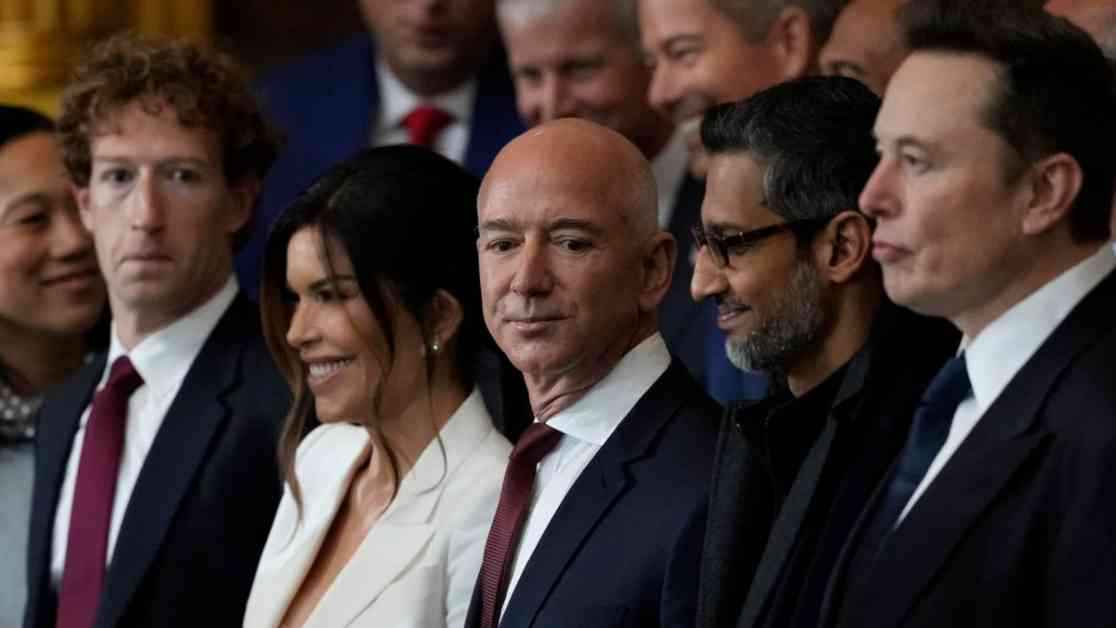Tech Titans Face Billion-Dollar Losses Following Trump Tariff Announcement
President Donald Trump’s recent declaration of “reciprocal” tariffs has sent shockwaves through the financial world, causing the wealthiest individuals to lose billions of dollars in net worth practically overnight. The announcement, made on Wednesday, outlined a 10% baseline tariff on all imported goods from every country, set to be implemented on April 5. Additionally, “individualized” tariffs reaching as high as 50% on specific countries and regions were also mentioned, prompting widespread concern and market turbulence.
In response to the news, major stock market indexes such as the Dow Jones Industrial Average, S&P 500, and Nasdaq Composite experienced significant drops, with each falling more than 5% on Friday alone, following similar losses on Thursday. This sudden downturn resulted in a collective loss of $30.9 billion for Elon Musk, $23.49 billion for Jeff Bezos, and $27.34 billion for Mark Zuckerberg, respectively. These three individuals, ranked as the world’s wealthiest, saw their fortunes take a major hit due to the tariff announcement, as reported by Bloomberg’s Billionaires Index.
The financial impact of the tariffs extended beyond just the top three billionaires, affecting a broader spectrum of wealthy individuals. The world’s 500 richest people collectively suffered the most extensive two-day loss ever recorded by the Bloomberg index. The tech sector, in particular, bore the brunt of the announcement, given its heavy reliance on manufacturing, computer chips, and IT services from countries like China, India, and Taiwan.
Implications for the Tech Industry
With a significant focus on the tech industry, the newly announced tariffs have raised concerns about the future of companies like Tesla, Amazon, and Meta. The imposed tariffs include a 32% rate on Taiwan, a 26% rate on India, and an increased rate on China, bringing it to 54% on imported goods. These changes have the potential to disrupt the supply chain and increase production costs for tech manufacturers, ultimately impacting their bottom line.
The economic repercussions of these tariffs extend beyond manufacturing, with potential effects on advertising revenue for companies like Amazon and Meta. A decrease in American economic growth could further compound the challenges faced by these tech giants, as highlighted by CNBC’s Investing Club with Jim Cramer. The interconnected nature of global trade and technology underscores the complex web of consequences resulting from these policy decisions.
Insights from Industry Leaders
Amidst the financial turbulence, voices of reason and experience emerge to provide insights into the situation. Mexican businessman Carlos Slim, a seasoned investor and former world’s richest person, shared his perspective on the tariffs, viewing them as a temporary measure and a negotiation tactic. Slim’s pragmatic approach to the situation reflects a deep understanding of global economic dynamics and the nuances of international trade relations.
In a recent interview with Bloomberg, Slim expressed confidence that the U.S. would eventually recalibrate its approach, emphasizing the need for flexibility and adaptation in the face of changing circumstances. His long-standing success in the business world, coupled with his astute observations, offers a valuable perspective on navigating uncertain economic waters. As the situation continues to evolve, the wisdom of seasoned leaders like Slim serves as a guiding light in turbulent times.
As the financial landscape adapts to the aftermath of the tariff announcement, the resilience and adaptability of businesses and individuals will be put to the test. The intricate dance of global trade, policy decisions, and market dynamics underscores the complex interplay of factors shaping our economic reality. In the midst of uncertainty, the insights of industry leaders and the resilience of the tech sector will play a pivotal role in charting a path forward.














